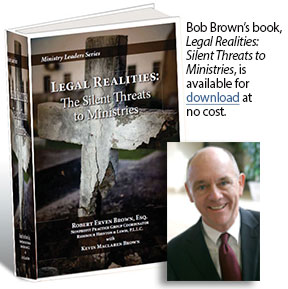 “Gee, I wonder if I can legally pray at my desk.”
“Gee, I wonder if I can legally pray at my desk.”
“Am I legally allowed to leave my Bible lying on my desk, in plain sight?”
“Can I share my faith with my co-workers?”
“What about sharing my faith with my boss?”
“May I share my faith with my subordinates?”
“How about sharing my faith with my customers?”
In these days when we hear the phrase “separation of church and state” thrown around like it’s the Gospel, it can be confusing to sort out just what’s acceptable behavior in the workplace and in our businesses!
Newspapers report stories about employees advancing claims of religious discrimination when their religious beliefs and practices conflict with job expectations and workplace policies. Typically, when discussing constitutional law, we find a sense of tension between the rights of the majority and the rights of the minority.
In this culturally sensitive issue, however, developing an appropriate legal response depends heavily on the context of the question. Thus, as you read the following material, please remember that good legal analysis depends on the specific factual context; so, it’s important to remember that changing a single factual assumption can change the outcome of a law case. Please take these suggestions as general guidelines only, and not as specific advice for your situation.
After researching the topic in-depth, I’ve found myself shocked by the extent to which the media exaggerates the separation of church and state. Many of us believe that religion and the workplace are oil and water — completely separated. Mass media illustrates the workplace as a zero-tolerance zone. Unlike sexual harassment and other employment law cases, religion in the workplace remains open to interpretation. The U.S. marketplace of free ideas allows free speech. If you can talk about football, American Idol, or politics at work, you can certainly talk about religion.
According to the Equal Opportunity Employment Commission, religious accommodation complaints have steadily risen over the past few years. Employers often struggle balancing work-faith conflicts such as religious holidays, dress code, and other duties that interfere with beliefs. Under the Civil Rights Act of 1965, employers aren’t completely required to eliminate all such conflicts. My suggestion? Listen before speaking, and steer clear of harassment.
The U.S. Courts of Appeals are divided on the extent to which employers must accommodate their employees’ religious beliefs and practices. Different regulations exist for supervisors and employees. Supervisors: Remember that you hold the power.
A supervisor must remain cognizant of the messages that he or she relays. Be careful with what you disapprove; our country was founded on principles of fairness. For example:
- A simple an inflexion of the eyebrow might be interpreted by your employee as a sign of disapproval.
- Hire employees based on ability, not religion.
- Pay all employees equally and allow them to compete fairly, regardless of religious beliefs.
- Freedom of religion is freedom from religion as a factor in evaluating performance.
But What if I Own the Company?
In the private sector, pay attention to the idea that the consumer “owns their own feet.” Be prepared to lose business for private decisions based on religious beliefs. There are no constitutional limitations on a supervisor’s ability to lose his or her own money. If you choose to integrate religious beliefs into private business practices — for example, closing on Sundays — you’re perfectly free to make those decisions. Customers own their own feet and may “run” from offensive language or practices. Employers can encourage, yet not impose. They can invite, yet cannot require.
Government Job?
Government jobs can’t promote or inhibit religion. As an employee, remember that the government buys your time, not your soul.
On the other hand, employees deliver government services, not religion. During work, feel free to read the Bible during a lunch break. Any time that is yours may be spent how you choose.
Supervisors Are Different!
When considering religion in the workplace, remember to refrain from imposing your ideas. Employees and supervisors are free to bring up the subject of religion, to ask — or to answer — questions. However, try to maintain the “red light, green light” frame of mind. If a client, customer or co-worker takes your question out of context and flags you down, take the “red light” seriously. Stop the conversation. Most importantly, listen before you talk.
In certain situations, integrity and work ethic are an employee or employer’s best defense. Especially when others stand opposed to a personal point of view, one’s best defense is dedication to the job. Strive for respect, and create the reputation you deserve. Conduct yourself in a way that makes the office buzz about your drive and commitment. If claims surface about your personal beliefs in the workplace, you will have already established yourself as hard worker.
This 15-minute video goes into more depth on the topic.
Additionally, here’s a quick list of practical do’s and don’ts:
Employees may:
- Keep a Bible or Koran on their private desk and read it during breaks.
- Engage in private religious expression in personal work areas.
- Discuss their religious views with one another in the cafeteria and hallways.
- Display religious messages on items of clothing to the same extent as they are permitted to display other comparable.
- Wear religious medallions over their clothes, a yarmulke, a head scarf or a hyob, etc.
- Urge a colleague to participate in religious activities, or to refrain from other personal endeavors.
- Display religious art and literature.
Managers should avoid/minimize discussion of these topics with employees:
- Politics
- Criticism of other company personnel
- Race, religion or ethnicity
- Sex, drugs or alcohol use
- Medical conditions and personal finances
- Off-color or suggestive jokes and gossip
Government agencies, as employers, may not/cannot:
- Restrict all posters or poster of a certain size, in private work areas, or require that such posters be displayed facing the employee.
- Restrict religious expression as long as it doesn’t interfere with workplace efficiency.
- Refuse to hire a Methodist, a Buddhist or impose more onerous requirements on applicants for employment.
- Impose — explicitly or implicitly — stricter promotion requirements based on one’s religion.
- Impose more onerous work requirements on an employee because the supervisor doesn’t share his or her religious beliefs.
 Robert Erven Brown is an attorney licensed to practice in Arizona. He and his nonprofit practice group work with nonprofits and churches helping them manage key operations connected with their missions, visions and causes. As permitted by local Rules of Ethics, they collaborate with attorneys who are licensed in states other than Arizona. Bob is author of Legal Realities: Silent Threats to Ministries, which describes his Campus Preservation Planning© initiative — a comprehensive program designed to manage the wide array of risks facing non-profit organizations. He can be reached by email or by calling 602.744.5748. RHL is located at 201 North Central Ave., Suite 3300, Phoenix, AZ 85004.
Robert Erven Brown is an attorney licensed to practice in Arizona. He and his nonprofit practice group work with nonprofits and churches helping them manage key operations connected with their missions, visions and causes. As permitted by local Rules of Ethics, they collaborate with attorneys who are licensed in states other than Arizona. Bob is author of Legal Realities: Silent Threats to Ministries, which describes his Campus Preservation Planning© initiative — a comprehensive program designed to manage the wide array of risks facing non-profit organizations. He can be reached by email or by calling 602.744.5748. RHL is located at 201 North Central Ave., Suite 3300, Phoenix, AZ 85004.



It’s good to know that government agencies and employers cannot restrict a poster. I was worried that I couldn’t have my religious poster at work. Showing my faith is a huge part of who I am so I am glad that won’t be restricted.